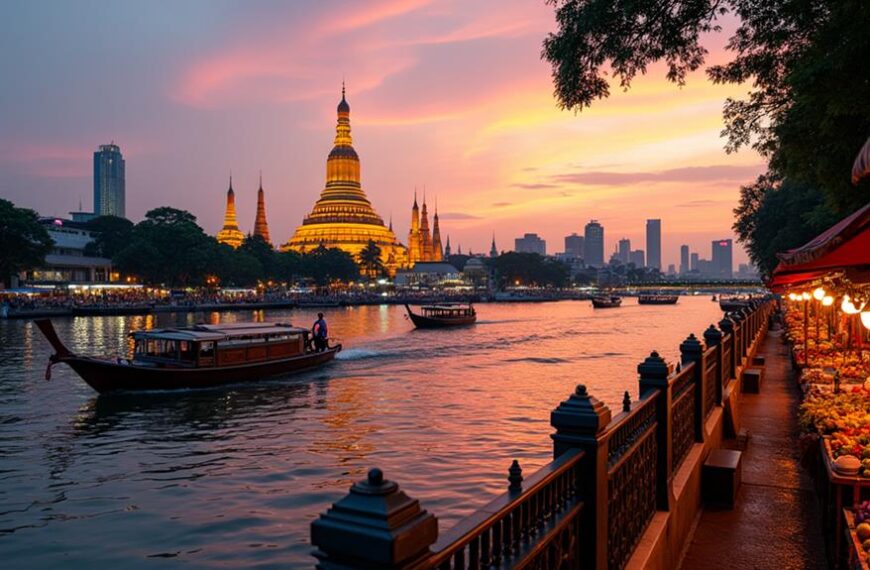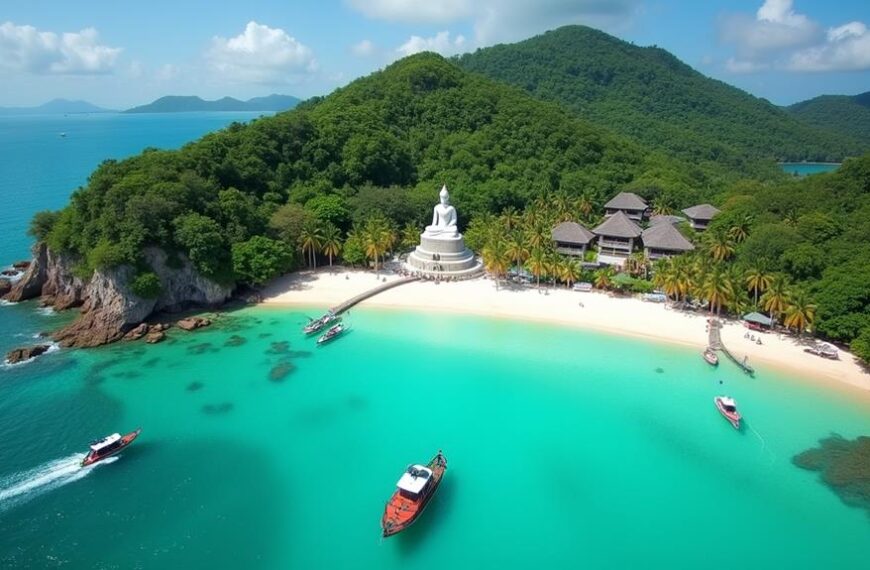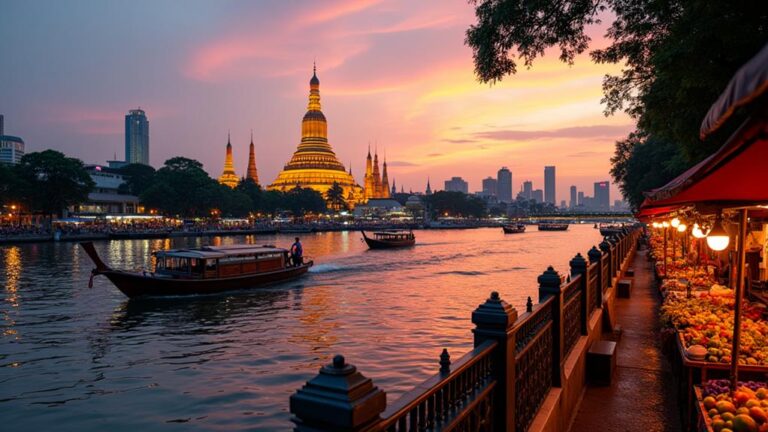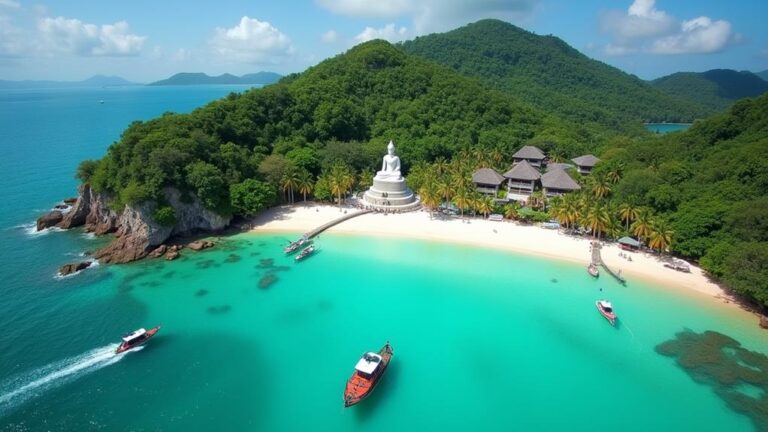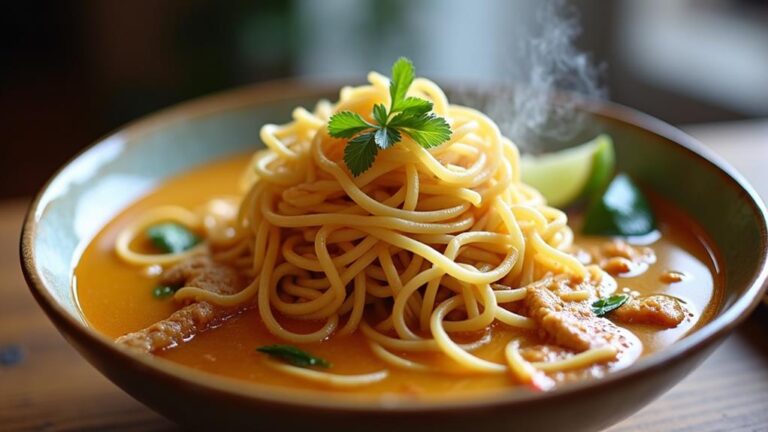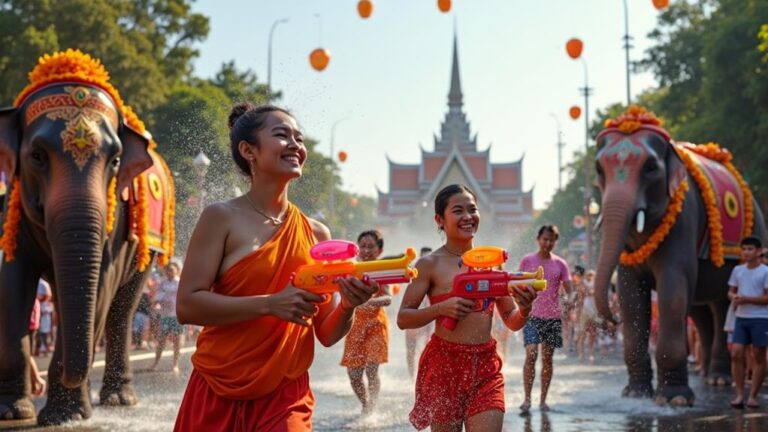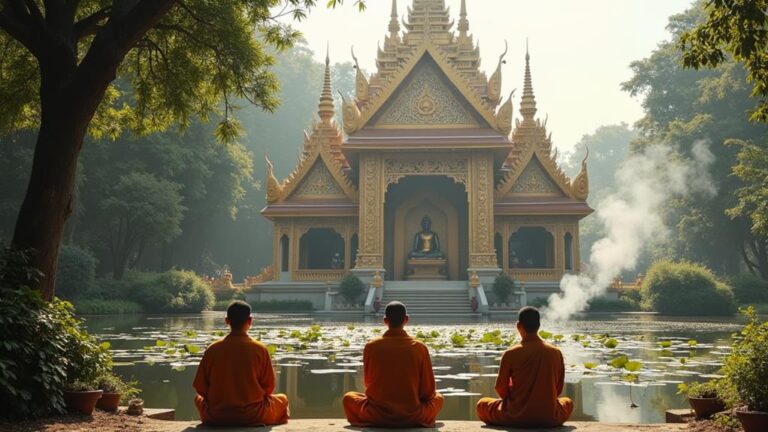Thailand's holiday calendar offers a vibrant mix of cultural celebrations you won't want to miss. You'll experience Buddhist observances like Visakha Bucha Day, honoring Buddha's life, and the ethereal Loy Krathong water festival. Don't overlook Songkran, the exuberant Thai New Year, or the serene Buddhist Lent period. Royal commemorations add historical depth, while regional festivities showcase local traditions. From lantern-lit nights in Chiang Mai to beachside parties in Krabi, each celebration paints a unique portrait of Thai culture. Whether you're seeking spiritual reflection or festive excitement, Thailand's holidays promise unforgettable experiences and deeper insights into this alluring country.
Table of Contents
Key Takeaways
- Songkran, celebrated in April, is Thailand's traditional New Year featuring nationwide water fights and cultural festivities.
- Loy Krathong, the Water Spirit Festival, illuminates waterways with floating lanterns in November.
- Visakha Bucha Day honors Buddha's birth, enlightenment, and passing with temple visits and spiritual reflection.
- The Yi Peng Lantern Festival in Chiang Mai fills the sky with thousands of illuminated lanterns.
- Royal commemorations like Coronation Day and the King's Birthday are significant national holidays in Thailand.
Major National Holidays
While Thailand boasts a rich tapestry of cultural celebrations, its 19 annual public holidays stand out as major events in the national calendar. You'll find a mix of traditional Thai, Buddhist, and modern observances that offer insight into the country's history and culture.
New Year's Day kicks off the year, but it's Songkran, the Thai New Year, that truly captures the nation's spirit. This vibrant water festival in April marks the beginning of the traditional Thai calendar.
Another significant holiday is Loy Krathong, where you'll witness thousands of floating lanterns illuminating waterways across the country.
Many national holidays in Thailand are rooted in Buddhism. Makha Bucha and Visakha Puja, based on the Thai lunar calendar, commemorate important events in Buddha's life. These days, you'll see temples filled with worshippers and colorful ceremonies.
Thailand also celebrates its monarchy and history with holidays like Coronation Day, Chulalongkorn Day, and Constitution Day. These events offer you a glimpse into Thailand's royal heritage and political evolution.
While not official holidays, national observances such as Children's Day and Forest Conservation Day are widely recognized, reflecting Thailand's commitment to its future generations and natural resources.
Buddhist Celebrations
As you explore Thailand's Buddhist celebrations, you'll encounter the profound significance of Visakha Bucha Day, which honors the Buddha's birth, enlightenment, and passing.
During Asalha Puja, you'll witness traditions that commemorate the Buddha's first sermon, marking a pivotal moment in Buddhist history.
Buddhist Lent, or Khao Phansa, offers a unique glimpse into monastic life, as monks retreat to their temples for three months of intensive meditation and study.
Visakha Bucha Day Significance
Celebrating the essence of Buddhism, Visakha Bucha Day stands as one of Thailand's most revered holidays. This Buddhist holiday celebrates three pivotal moments in Buddha's life: his birth, enlightenment, and passing into Nirvana. Falling on the full moon of the sixth lunar month, it's a time for spiritual reflection and good deeds.
As you explore Thailand during Visakha Bucha Day, you'll witness the country's deep spiritual roots. Buddhists flock to temples to make merit, listen to sermons, and participate in candlelit processions. The day celebrates the Buddha's first sermon, emphasizing the Four Noble Truths and the Eightfold Path.
To fully appreciate this significant day, consider:
- Visiting a local temple to observe or participate in rituals
- Joining a candlelit procession around a temple
- Learning about the core teachings of Buddhism
Practicing mindfulness and good deeds
– Exploring Buddhist art and architecture in temples
Visakha Bucha Day serves as a reminder to purify the mind, avoid harmful actions, and cultivate positive behavior. It's an opportunity for you to experience Thailand's rich cultural heritage and gain insight into the spiritual practices that shape the nation's identity.
Asalha Puja Traditions
Asalha Puja, another cornerstone of Thailand's Buddhist calendar, falls on July 16th and marks a pivotal moment in Buddhist history. This significant celebration commemorates the Buddha's first sermon after attaining enlightenment, setting the wheels of dharma in motion.
During Asalha Puja, you'll witness Thailand's devout Buddhists engaging in various merit-making activities. They flock to temples to listen to sermons and make offerings, expressing their deep reverence for the Buddha's teachings.
As you explore the country on this day, you'll notice government offices and schools closed, as it's a public holiday in Thailand.
Asalha Puja also signifies the beginning of Buddhist Lent, a three-month period of spiritual reflection. During this time, monks retreat to temples for intensive meditation, while laypeople often abstain from meat, alcohol, and other vices.
You'll observe a heightened sense of devotion throughout the country as Buddhists recommit to their faith.
If you're visiting Thailand during Asalha Puja, you'll have the opportunity to immerse yourself in these rich traditions and witness the profound impact of Buddhism on Thai culture.
Buddhist Lent Observances
Three months of spiritual devotion await both monks and laypeople during Thailand's Buddhist Lent, known locally as "Khao Phansa." This sacred period, typically spanning from late July to October, transforms the religious landscape of the country.
During Buddhist Lent, you'll notice a heightened sense of spiritual commitment across Thailand. Monks retreat to their temples, dedicating themselves to intensive meditation, study, and religious practices. As a visitor or resident, you can participate in merit-making activities and support the monastic community by offering food, candles, and other necessities.
The observance of Buddhist Lent is marked by various traditions:
- Candlelit processions illuminating temples and streets
- Increased almsgiving and donations to monasteries
- Special sermons and teachings by senior monks
- Abstinence from alcohol and other indulgences
- Kathina ceremonies at the end of Lent, where new robes are offered to monks
These observances not only strengthen the spiritual bonds within Thai society but also offer you a unique opportunity to immerse yourself in the rich Buddhist culture of Thailand. By participating respectfully, you'll gain a deeper understanding of the country's religious heritage and the significance of this sacred time.
Cultural Festivals

You'll be amazed by Thailand's vibrant cultural festivals, each offering unique experiences.
At Songkran, you can join in exhilarating water fights that symbolize purification and new beginnings.
During Loy Krathong, you'll witness the mesmerizing sight of floating lanterns illuminating rivers and skies, while the Phi Ta Khon Ghost Festival will introduce you to colorful masked parades and spirited revelry rooted in local folklore.
Vibrant Songkran Water Festival
Splashing, soaking, and celebrating, Thailand's Songkran Water Festival is a vibrant cultural extravaganza that marks the Thai New Year. From April 13-15, you'll find yourself immersed in a joyous atmosphere where water fights and cleansing rituals take center stage. This festival isn't just about fun; it's deeply rooted in tradition, symbolizing purification and the washing away of bad luck.
As you participate in Songkran, you'll experience:
- Engaging in exhilarating water fights with locals and tourists
- Cleansing Buddha images and temples with scented water
- Joining parades filled with colorful floats and cultural performances
- Savoring traditional Thai delicacies at family reunions
- Paying respects to elders through ceremonial water pouring
During this time, Thailand comes alive with a unique energy. You'll witness streets transformed into water battlegrounds, with people armed with water guns, buckets, and hoses.
But Songkran is more than just water fights; it's a time for spiritual renewal and strengthening family bonds. As you explore temples, take part in religious ceremonies, and interact with locals, you'll gain a deeper appreciation for Thai culture and traditions.
Loy Krathong Floating Lanterns
Illuminating the night sky, Thailand's Loy Krathong Festival transforms waterways into a sea of twinkling lights. You'll witness this enchanting celebration on the full moon night of the 12th lunar month, typically in November.
As you join locals in releasing beautifully decorated banana leaf boats, known as krathongs, onto rivers, lakes, and ponds, you'll be participating in a centuries-old tradition of paying respects to water spirits.
Each krathong carries a candle, creating a spellbinding display as they float away. You'll have the opportunity to make a wish for the upcoming year while releasing your krathong, symbolizing the letting go of past misfortunes and embracing new beginnings.
The festival's name, "Loy Krathong," literally means "to float a basket," reflecting the central activity of the celebration.
Beyond the floating lanterns, you'll be treated to a festive atmosphere filled with traditional performances, dazzling fireworks, and various cultural activities. Loy Krathong embodies themes of gratitude, forgiveness, and renewal, making it a deeply meaningful experience.
As you immerse yourself in this enchanting festival, you'll gain a unique insight into Thai culture and spirituality.
Ghost Festival Traditions
Ghostly figures and eerie sounds fill the streets of Thailand during the annual Ghost Festival, a three-day spectacle held each August. This vibrant celebration honors ancestors and aims to cleanse bad luck from the past. You'll witness a unique blend of parades, music contests, shows, and Buddhist ceremonies that bring local communities together to celebrate Thai culture and folklore.
During the Thai Ghost Festival, you'll experience:
- Thousands of candles and lanterns illuminating the night sky
- People dressed as ghosts to recreate ancient legends
- Traditional dances and performances
- Colorful decorations adorning streets and homes
- Offerings made to appease spirits and bring good fortune
As you explore the festival, you'll be immersed in the rich spiritual beliefs surrounding ghosts and the afterlife. The event showcases the deep connection between the living and the dead in Thai culture.
You'll witness firsthand how locals come together to honor their ancestors and participate in age-old traditions. The Ghost Festival offers a unique opportunity to experience Thailand's fascinating folklore and spiritual practices while enjoying the lively atmosphere of this unforgettable cultural celebration.
Royal Commemorations
When you're in Thailand, do you envision its rich royal heritage? The country's calendar is dotted with royal commemorations that offer you a glimpse into its regal history and traditions.
You'll find Chakri Day on April 6, marking the establishment of the Chakri dynasty. This celebration honors the founding of Thailand's current royal lineage.
On May 5, you can witness the grandeur of Coronation Day, commemorating the crowning of Thai kings.
Don't miss the King's Birthday on December 5, which also serves as Father's Day. This special day pays tribute to the late King Bhumibol Adulyadej, also known as King Rama IX, who was deeply revered by the Thai people.
If you're visiting in October, you'll encounter Chulalongkorn Day on the 23rd. This holiday remembers King Rama V, a monarch credited with modernizing Thailand.
Eventually, August 12 marks the Queen's Birthday, doubling as Mother's Day and honoring Queen Sirikit. These royal commemorations not only celebrate Thailand's monarchs but also offer you a unique opportunity to experience the country's deep-rooted respect for its royal institutions.
Traditional Observances

Thailand's traditional observances offer you a window into the country's rich cultural heritage and deep-rooted Buddhist practices. These celebrations, often linked to significant events in Buddhism, provide a unique opportunity to immerse yourself in Thai culture.
As you explore Thailand during these traditional observances, you'll encounter:
- Vibrant cultural parades showcasing traditional Thai costumes
- Solemn ceremonies at Buddhist temples
- Colorful decorations adorning streets and buildings
- Lively festivals featuring traditional music and dance
- Unique rituals that highlight Thailand's spiritual beliefs
Some of the most important Buddhist holidays you shouldn't miss include Vesak, commemorating the Buddha's birth, enlightenment, and death, and Songkran, the Thai New Year celebration. Chakri Memorial Day is another significant observance honoring the founding of the current royal dynasty.
During these events, you'll witness engaging cultural performances that bring Thailand's history and traditions to life. As you participate in these celebrations, you'll gain a deeper understanding of the country's spiritual foundations and the importance of Buddhism in Thai society.
These traditional observances offer a truly authentic experience, allowing you to connect with Thailand's cultural roots and create lasting memories.
Regional Festivities
Throughout Thailand, you'll discover a vibrant tapestry of regional festivities that showcase the country's diverse cultural heritage. As you travel from north to south, you'll encounter a fascinating array of local festivals and celebrations, each reflecting the unique customs and traditions of its region.
In the northern city of Chiang Mai, you can experience the ethereal beauty of the Yi Peng Lantern Festival, where thousands of illuminated lanterns are released into the night sky.
Meanwhile, the southern beaches of Krabi offer a different kind of celebration, with beachside parties and traditional performances that capture the laid-back spirit of coastal life.
Bangkok, the bustling capital, presents a blend of modern and traditional festivities, where you can witness both ancient rituals and contemporary celebrations. As you explore different regions, you'll notice how geographical location and cultural influences shape each area's unique celebrations.
Holiday Travel Tips

Several key travel tips can enhance your holiday experience in Thailand, ensuring you make the most of the country's vibrant festivities. When planning your trip, consider aligning it with major holidays like Songkran (Thai New Year) or Loy Krathong for an unforgettable cultural immersion. Be mindful of public holidays, as they may affect business hours and transportation schedules. Research traditional observances and special events happening during your stay to fully experience Thailand's rich cultural celebrations.
To make the most of your holiday travels in Thailand:
- Plan around major festivals like Songkran for a unique cultural experience
- Check public holiday dates to anticipate potential schedule changes
- Participate in Buddhist festivals or royal celebrations for local insights
- Seek out special events or regional festivities to enrich your trip
- Respect local customs and traditions during holiday celebrations
Remember to show reverence during religious ceremonies and observe proper etiquette at cultural events.
By immersing yourself in Thailand's holiday traditions, you'll gain a deeper appreciation for the country's rich heritage and create lasting memories.
Whether you're joining in the water-splashing fun of Songkran or witnessing the serene beauty of Loy Krathong, embracing these cultural celebrations will make your Thai holiday truly extraordinary.

